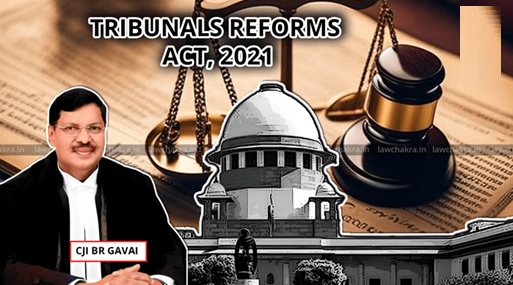(Prelims: Current Affairs)
(Mains, General Studies Paper 2: Appointment to Various Constitutional Posts and Powers, Functions, and Responsibilities of Various Constitutional Bodies) |
Context
On November 19, 2025, the Supreme Court declared several key sections of the Tribunal Reforms Act, 2021, unconstitutional. The Court stated that the Act gives the Central Government excessive control over the appointment, functioning, and service conditions of tribunals, which is against the independence of the judiciary. The Court directed the Central Government to establish the National Tribunals Commission (NTC) within four months.

Recent Issues
- The Supreme Court found that the Tribunals Reforms Act, 2021, reinstated the same provisions that were in the 2021 Ordinance that the Court had already struck down.
- This resulted in Parliament overriding the Court's orders and imposing legislative overreach. Several provisions give excessive power to the executive, affecting the independence of tribunals.
The Tribunals Reform Act 2021
- This law was passed in 2021, with the aim of:
- Merging various tribunals
- Changing the appointment process for members
- Imposing new rules on service conditions
- However, many of its provisions were similar to an ordinance previously struck down by the Supreme Court.
The Central Ordinance and Its Replication
- In 2021, the Central Government issued the Tribunals Reform Ordinance. The Supreme Court declared it unconstitutional in July 2021.
- However, Parliament subsequently reintroduced almost the same provisions into the Act with minor changes. The Supreme Court described this as "old wine in a new bottle."
The Supreme Court's Order: Key Points
- Parliament cannot ignore court orders.
- The independence of tribunals is a constitutional requirement.
- The executive cannot be given excessive control over tribunal appointments and service conditions.
- The establishment of the National Tribunal Commission is mandatory within four months.
Provisions struck down by the Supreme Court
- Tenure
- The Act fixed a four-year term for tribunal members.
- The Supreme Court had already stated that this was too short and undermined independence.
- Therefore, it was declared unconstitutional and struck down.
- Minimum Age Limit of 50 Years
- The Act set a minimum age of 50 years for members.
- The Court stated that this excluded qualified, experienced, but young experts.
- This age limit was impractical and unconstitutional, and was therefore struck down.
- Excessive Control of the Central Government
- The Central Government had control over salaries, allowances, tenure, and the appointment process.
- The Court considered this to be against judicial independence.
- Closure of Nine Tribunals
- Several specialized tribunals were abolished and their cases transferred to the High Courts.
- This increased the burden on the High Courts and weakened the system of specialized justice.
- This provision was also declared unconstitutional.
Key Points
- The Center cannot arbitrarily decide on the structure, appointments, and salaries of tribunals.
- The Court stated that its previous order was not merely advisory, but a binding directive.
- The Court clarified that “the Constitution is what the Supreme Court says.”
- The executive’s powers are limited, and judicial independence is paramount.
Significance
- This decision strengthens the independence of judicial institutions in India.
- Transparency and fairness will be ensured in the appointments and service conditions of tribunals.
- The National Tribunals Commission will create a unified, independent monitoring mechanism.
- The decision sends a message to prevent the executive from ignoring judicial directives.
Challenges
- Establishing the NTC within four months may be administratively difficult.
- Maintaining coordination between the central government and the judiciary will be challenging.
- The vacancies, infrastructure, and facilities in tribunals are already inadequate.
- The increased burden on high courts due to the abolished tribunals will not be immediately alleviated.
- Ensuring transparency and timeliness in the appointment process will be difficult.
Way Forward
- The NTC should be established as soon as possible.
- Expertise, diversity, and independence should be prioritized in the appointment process.
- The infrastructure of high courts and tribunals should be strengthened.
- The government should formulate policies based on the Supreme Court's guidelines.
- Legislative reforms should aim to enhance the independence, efficiency, and accountability of the judiciary.



